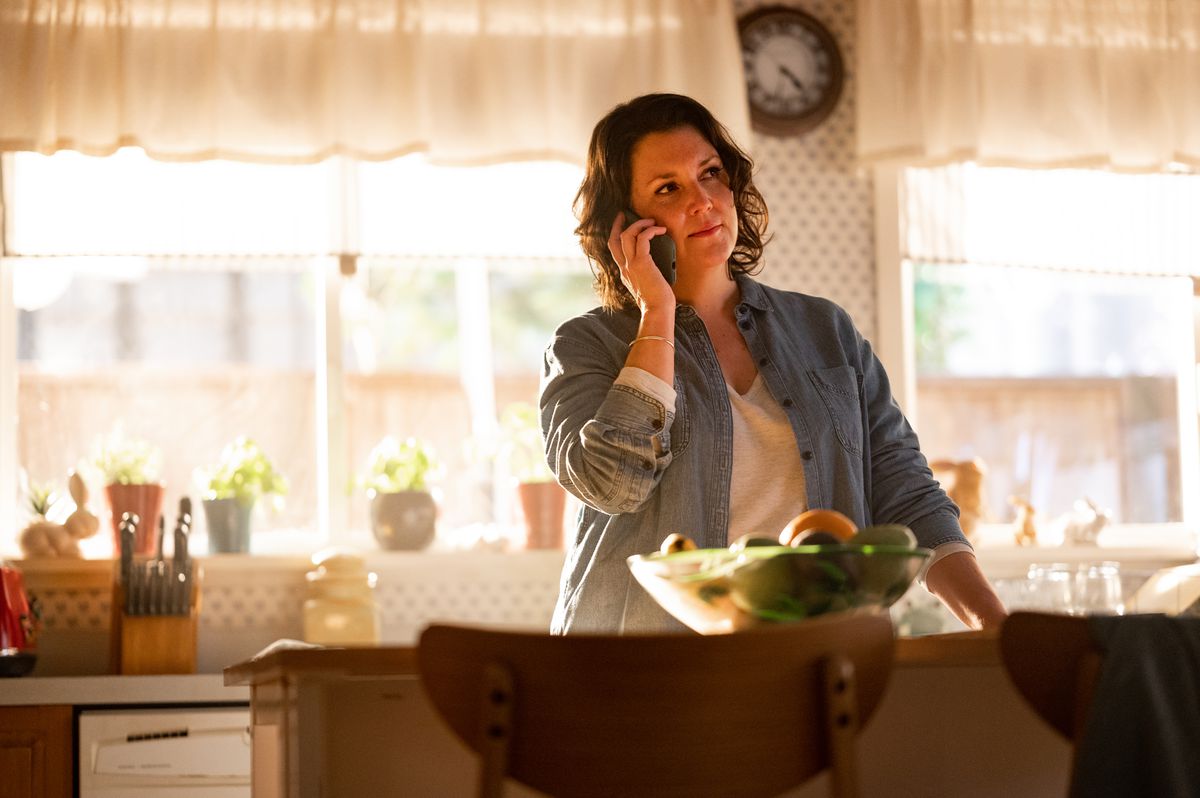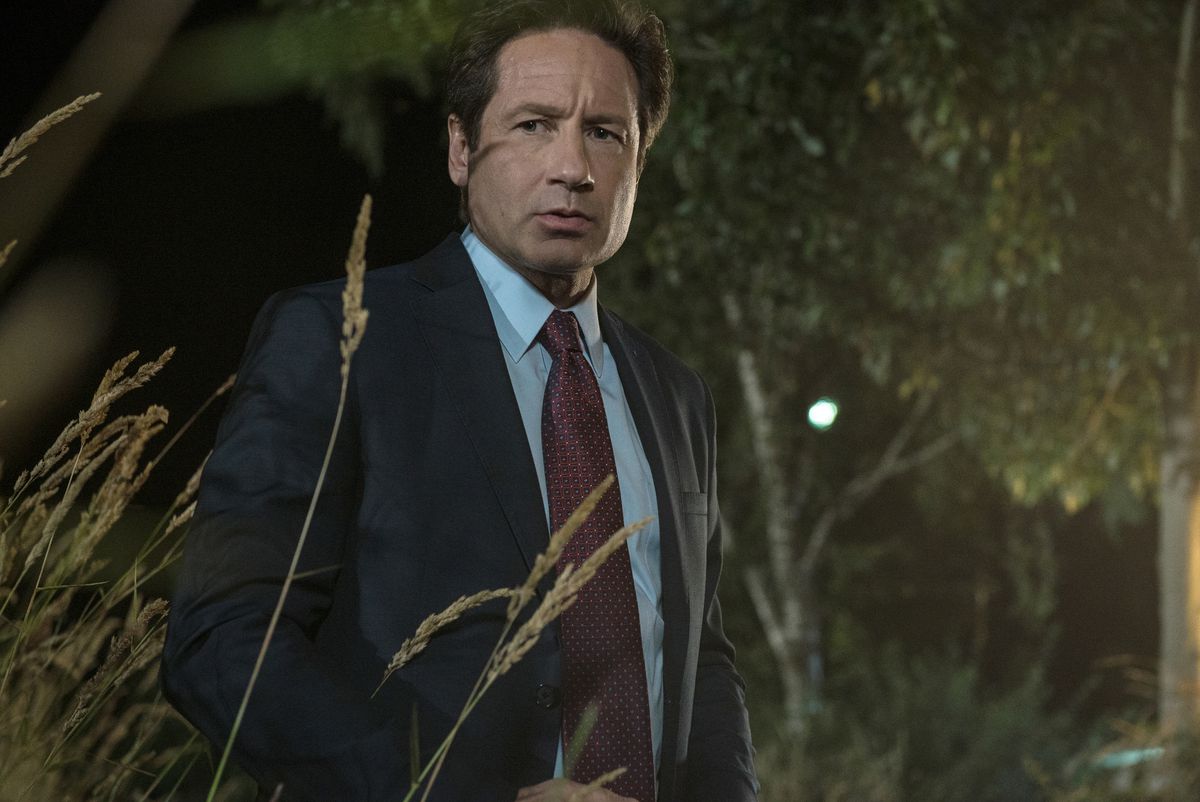Yellowjackets finale: TV’s buzziest shows aren’t trying to trick viewers
Somewhere in the middle of “Doomcoming,” the penultimate episode of Yellowjackets’ first season, I had the pleasantly discombobulating feeling of realizing I wasn’t watching the TV show I thought I was.
The buzzy (haha) Showtime series about a soccer team of teenage girls struggling to survive in the wilderness, contrasted with their adult selves 25 years later, has drawn comparisons to Lost from many, including me. Both shows, after all, feature dueling timelines, an eerie wilderness that might be supernatural in nature, and a plane crash.
I also drew Lost comparisons, though, because I thought Yellowjackets was what is typically known as a mystery-box show. On a mystery-box show, big questions unfurl into smaller questions, which unfurl into even smaller questions, which often loop back to the bigger questions. Ideally, those questions lead into each other. For instance, on Lost, the question of, “What’s in this mysterious hatch we found on the island?” had an answer (“some guy named Desmond”) that led into a host of other questions. (“Who does he work for?” “How did he wind up on the Island?” “How do the people he works for know about the island?”)
And Yellowjackets certainly has elements of the mystery-box show in its DNA. Core to the show is the question of how its main characters escaped the wilderness to begin with. Since we’re also seeing those characters as adults, we know they escaped after 19 months in the middle of nowhere and that the show will inevitably have to explain how that happened. But crucially, this is a question the audience has that the characters don’t. The adult versions of these women know how they got home. We’re the ones who don’t.
The longer you watch Yellowjackets, the more you realize that’s true of most of its mysteries. A character in the show usually knows the answer, and even if we don’t, what happened to them is informing how they act. Almost all of the mysteries established by the show’s pilot, mysteries I thought would last for several seasons, are largely answered by the end of the first season.
Who was the mysterious Antler Queen, the head of the cannibal society briefly teased in the show’s pilot? At the end of the finale, we more or less know. What happened to team captain Jackie out in the woods? We know that too. Could the show swerve away from these reveals? Sure. But why would it? Dealing with what happened next is so much more compelling than trying to somehow outsmart an audience that is literally crowdsourcing answers to your mysteries on Twitter and Reddit.
It’s a different rhythm than TV fans are currently used to, but it’s part of a larger trend within TV drama at the moment, one where living with the implications of an answer bears richer drama than wrestling with the thorniness of a question.
Even if more shows are tamping down on their mystery-box qualities, we’re still discussing them like they’re keeping huge secrets
As an example of Yellowjackets’ interest in subverting your mystery-box expectations, look at a mystery within the show that turned out to be exactly what it seemed to be. Early in the season, the adult Shauna (one of the crash survivors, played by Melanie Lynskey) rear-ends a hot guy named Adam (Peter Gadiot). The two spark with each other and start sleeping together. But who is Adam?
The obvious answer here is: Adam is a man Shauna just happened to be in a car accident with. Because she’s the one who rear-ended him, rather than the other way around, it would strain credulity for him to be anything other than who he says he is. But the series’ fandom spent much of the season obsessing over who Adam might be. Was he one of the other crash survivors? Was he working on a scam to get Shauna to tell all? Was he (my favorite goofy theory) a trans man who was also Shauna’s former best friend?
The show did lean in the general direction of the speculation about Adam’s identity. Shauna’s daughter (who learned of her mother’s affair) was unable to find an online presence for the guy, which felt suspicious considering he was an artist, and Shauna caught him in a lie about his past.
But in the end, Adam was … some guy Shauna rear-ended whom she sparked with. The show got its audience to so successfully internalize Shauna’s paranoia, driven by her past, that it became easy to miss how unlikely it was that he would be anybody but who he said he was.

The rise of TV discussion online closely paralleled the rise of the mystery-box show. One of the earliest shows to inspire wide conversation and debate online was The X-Files, which ran (in its initial incarnation) from 1993 to 2002. That show’s massive alien conspiracy plotline all but begged audience members to sit down and try to connect the dots among its many elements.
And the ultimate resolution of that conspiracy led to a common pattern for mystery-box shows: If you really want to do the work, you can figure out exactly what the conspiracy was up to, but it’s so complicated and obscured that you’re unlikely to do the work. I’ve watched The X-Files many times (I literally wrote a book on it), and I can more or less tell you what the conspiracy was up to. But if I did this, I guarantee you your eyes would glaze over. It’s so needlessly complicated that you’ll simply bounce off it at some point.
But The X-Files’ popularity on the internet established a rough pattern for how we talk about TV online: We try to guess what the show is up to, even if the show isn’t being particularly unclear. And the closer that show gets to fantasy, sci-fi, or horror, the more we’ll keep trying to guess. Yellowjackets, as a horror show where certain elements are kept hidden from the audience, knows exactly what TV traditions it’s playing in. It uses those traditions to subvert our expectations in interesting ways.
An alien conspiracy isn’t a prerequisite for this kind of argument, though; even series grounded in reality attract this kind of thinking. Succession, for instance, has proved across three seasons that it doesn’t do big twists or surprising reveals, yet it continues to be talked about as though it does. Time after time, the show will present something that is more or less straightforward on a storytelling level, but its audience will argue about it endlessly, as though some big reveal is right around the corner. It’s what we’ve been trained to do, and Succession knows that.
The mystery-box tradition is simply a heightened version of something in TV discussion that predates the internet. The secret sauce of a big and buzzy TV show since the late 1970s has often been giving the audience something to speculate and argue about from week to week, and internet discussion turns that up to a fever pitch. If Dallas’s famed “Who shot J.R.?” mystery from 1980 had aired in 2022, we would have worked ourselves into a collective tizzy on Twitter arguing over it.
But with this much online speculation, these mysteries are inevitably solved by the audience before the show can reveal what’s up. So when Yellowstone season three ended with most of the major characters in peril, season four started by revealing across its first two episodes that, nah, everybody was fine without a ton of unnecessary drama. Audiences already knew to expect that, because Yellowstone is not a show that kills off major characters (it’s had ample opportunity to do so and has never taken the bait), but the show seemed to almost deliberately subvert expectations anyway.
Streaming shows that drop all at once can sometimes get away with leaning into the mystery box of it all, but even there, things are changing slowly but surely. The first season of Netflix’s The Witcher offered up a complicated tripartite timeline that viewers had to puzzle out, but its second season was much more straightforward. Granted, that series is based on books, and the second season seemed to inspire a lot less online chatter than the first, but it still played into this larger trend.
Similarly, HBO Max’s Station Eleven (also based on a book) teased out several things that felt like mysteries but which had mostly clear answers that audiences could figure out ahead of time. The drama didn’t come from the answers being provided but from watching the characters wrestle with what those answers meant for their lives. A lesser show would have kept the secret history of the show’s main villain from the audience until the end of the season. Station Eleven told us pretty much right after we met him.
Why the mystery-box show rings false in 2022
As audiences in 2022, we’re burnt out on the mystery box. Too many shows with mystery-box elements ended up with the X-Files problem: The amount of dedication you had to have to unpeel all of their elements was simply too heavy a lift for many viewers. I love Lost’s finale and its gutsy choice to accept that any answer to “What is this mysterious island?” was bound to disappoint. But I understand why many found that enervating.
What’s more, we live in a reality where too many people try to turn the world into an elaborate conspiracy-driven hellhole, where everybody is trying to keep the truth from you and the villains are hidden in shadow. And that mentality cuts against something we know to be true, which is mostly that the villains are right out there in the open. Conspiracy theories in the real world have too often become a coping mechanism for those who feel powerless in the face of problems that seem insurmountable. If the truth is hidden in shadow, that’s an easier reality to approach than one where you know the truth but can’t do anything about it.
When I wrote my X-Files book (yes I’m going to link to it again), creator Chris Carter was most obviously troubled in my interviews with him by the show’s legacy as ground zero for a lot of conspiratorial thinking in the American subconscious. The X-Files laundered conspiracy theories in some ways. It made them sexy and fun, and it pushed them into the mainstream. That choice was great for storytelling in the 1990s, but when the show came back for two revival seasons in the 2010s, it spent a lot of time worrying about figures like Alex Jones and Donald Trump, whose conspiratorial ramblings didn’t sound all that dissimilar from various X-Files characters.

So what’s the other option here? Well, the other option is a show where what’s happening is clear and where the show tells you, multiple times, what’s up, and then the most obvious answer is the one that ultimately pays off. Sometimes, the hunk you rear-end with your car is just a hot guy, not part of a massive conspiracy.
I was struck by this recent quote from Station Eleven showrunner Patrick Somerville’s interview with Rolling Stone’s Alan Sepinwall. In it, Somerville recounts a piece of advice he got from Damon Lindelof, who happens to be the co-creator of famed mystery-box show Lost.
People don’t want twists. What they want is to be told four times that it’s coming, and then for it to come. Because then different kinds of watchers are prepped. Some people can get out ahead of it and know it’s coming. Some are still surprised, but subconsciously, it’s a warmer embrace of a turn. It’s not quite a surprise, but it’s a hope that you are falling towards, just like water over a waterfall.
Not every show has you falling toward hope. Succession has you falling toward the inevitability of destruction, while Yellowstone has you falling toward the inevitability of the status quo. And Yellowjackets keeps you plummeting toward the terrifying dread of those girls in the woods starting to cannibalize each other. All of these shows tell you where they’re going, again and again, and dare you to say otherwise.
The problems we have to face in 2022 are not hidden from us, and the people keeping us from fixing them aren’t either. Income inequality continues to spiral out of control, and Covid-19 exposed endless faults in various governmental structures the world over. America is gripped by political dysfunction. And I don’t know if you’ve heard, but the climate is kind of a mess right now.
To pretend that we don’t know what needs fixing is to willfully ignore what we know about the world. The shadows mostly hide faces and problems we already know well. Maybe that’s why so many of our best TV shows right now feature something we know is just around the corner. We’re powerless to stop it from coming, but we’re not yet powerless to stop it entirely.


